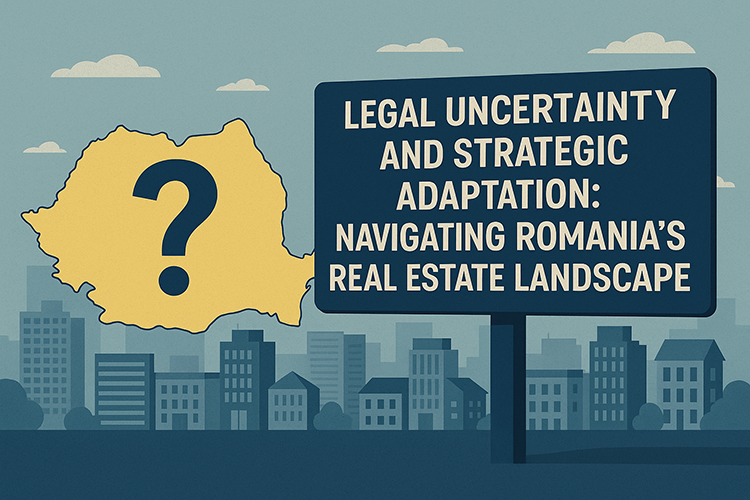Legal uncertainty and strategic adaptation: Navigating Romania’s real estate landscape
CIJ EUROPE recently spoke with Ioana Roman, Partner and Head of the Real Estate practice at Filip & Company, to explore the key legal and regulatory issues currently shaping Romania’s commercial property market. The conversation highlighted a range of challenges—from legislative instability and unexpected tax changes to ESG obligations and the shifting legal environment for investors.
One of the most significant challenges investors continue to face is the lack of legal predictability. Ad-hoc legislative changes—often introduced without consultation with the private sector—remain a persistent concern. “You need a comprehensive risk assessment before entering the market,” the Partner stressed, pointing out that unpredictability affects not only fiscal matters but also urban planning. In Bucharest, for instance, the development of projects is restricted due to blocked urban planning approvals, pushing investors to consider alternative markets such as Brașov, Cluj-Napoca, Iași, and Timișoara.
Recent fiscal changes have added further complexity. The reintroduction of the construction tax, previously abolished, has caught many off guard. While standard commercial real estate assets may not be heavily impacted, infrastructure and logistics developments that don’t qualify as traditional “buildings” are now subject to significant new tax burdens.
Moreover, legislative drafts introduced in response to a high-profile residential scandal in Constanța are poised to reshape Romania’s residential sector. These proposals limit advance payments by buyers to 10–15%, mandate legal counsel for purchasers, and require provisional land registry records before pre-contracts can be signed. While intended to increase buyer protection, such measures could complicate financing models and delay transactions.
Thorough due diligence is essential in Romania’s real estate market, especially given the potential for errors in land registries and unresolved restitution claims. The legal expert emphasised the importance of contractual safeguards such as price holdbacks or title insurance to mitigate risks. “Unlike in the Czech Republic or Hungary, where land registries are more reliable, in Romania you still need to verify everything—even if the land book shows you as the owner,” she noted.
Another recent development affecting foreign and domestic investors alike is Romania’s expanded foreign direct investment (FDI) screening regime. Any investment exceeding EUR 2 million—whether in acquisition or development—now requires clearance, regardless of the asset type. While the process is generally smooth for EU investors, it introduces additional time and cost, particularly as the authorities are currently overwhelmed and slow to respond.
Romania’s full accession to the Schengen Area and continued improvements in infrastructure have started to yield tangible benefits. Reduced border delays and better logistics are improving conditions for the industrial and logistics sectors. Combined with EU funds, these developments are enhancing Romania’s regional competitiveness.
ESG requirements are also becoming central to real estate development strategies. While new buildings in Romania often meet high standards due to their relatively recent construction, older stock poses challenges. A revised EU directive on energy performance will require legislative changes and potentially costly renovations. Whether financed by private owners, the state, or EU incentives remains to be determined. Meanwhile, tenants are increasingly seeking modern, ESG-compliant spaces, pushing landlords to adapt or risk vacancy.
Another key initiative still pending is the legislation for real estate investment trusts (REITs). Unlike neighbouring Bulgaria, Romania has yet to finalise a framework. The proposed law would offer fiscal neutrality to the trusts, these being seen as “pass-through entities” from a tax point of view so that taxation of incomes related to real estate assets will occur only at the level of the shareholder (investor) and no longer at a double level – company level and shareholder level.
However, this draft law remains stalled in parliament and its tax initial structure, which is the essence of this law, is current under debate.
Despite the regulatory headwinds and political uncertainty ahead of the upcoming elections, the long-term outlook remains cautiously optimistic. “Romania has shown resilience through numerous challenges,” the lawyer noted. While short-term investments may carry higher risks, those taking a medium- to long-term approach continue to find opportunities, particularly in retail parks, logistics, and select residential developments.
Romania’s commercial real estate sector is undergoing significant regulatory change, making it a market that demands legal precision and strategic foresight. “This is not a market for short-term speculation,” the Partner concluded, “but it continues to offer real opportunity for those prepared to navigate its complexities.”










